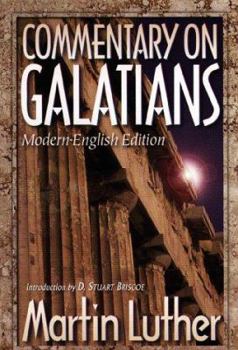Commentary on Galatians: Modern-English Edition
(Part of the The Crossway Classic Commentaries Series)
Select Format
Select Condition 
Book Overview
The Book of Galatians was a key in turning Luther to an understanding of God's grace through faith alone. Wrote Luther, "The one doctrine which I have supremely at heart is that of faith in Christ, from whom, through whom and unto whom all my theological thinking flows back and forth day and night."
Format:Paperback
Language:English
ISBN:0800756487
ISBN13:9780800756482
Release Date:January 1998
Publisher:Fleming H. Revell Company
Length:416 Pages
Weight:1.45 lbs.
Dimensions:1.2" x 6.1" x 9.2"
Age Range:21 years and up
Grade Range:Postsecondary and higher
Customer Reviews
4 ratings
By Faith Alone (Sola Fide)
Published by Thriftbooks.com User , 20 years ago
This is, in my estimation, the greatest non-canonical book ever written. Luther expounds Paul's epistle to the Galatians with an insight, power and depth of emotion which is sorely lacking in modern commentaries. He is not concerned with the various potential interpretations of "problematic passages" that fill the pages of other commentaries. From the very first page Luther cuts to the heart of the epistle-the doctrine of justification-in the way that only he can. His bold words and plain-sense interpretations result in a work filled with much of the same force and passion that characterized the epistle itself. The grace of God and the love of Jesus Christ cling to every word like the scent of a precious perfume. I cannot recommend this work highly enough. This is the very essence of the gospel as understood by the one who "rediscovered" the doctrines of faith and grace as he teaches us from the words of the one to whom God first revealed those doctrines. If you are looking for an up-to-date critical commentary or a greek-focused exegetical work then you will not find it here, but if you would hear a plain declaration of the power and wisdom of God then you will not find a better treatise apart from the Bible. (Note: This review is based upon the 415 page edition introduced by D. Stuart Briscoe--both are abridgments of Luther's actual commentary).
Justification by Faith in all its Monumental Brilliance
Published by Thriftbooks.com User , 24 years ago
Martin Luther (1483-1546 AD) became an Augustinian, Roman Catholic monk where he studied the Word of God diligently while still in the monastery. His study convinced him to post his 95 theses, statements he wanted to debate within the context of the Church to restore it. The rest is history as Martin Luther was excommunicated from the Roman Catholic church and became the first "Lutheran." Luther was convinced that: God justifies a person (declares him righteous and acquits him) by faith alone and not by works, each believer has access to God directly apart from any human intermediaries, and the Scriptures are the true source of authority for both faith and life. Many of his doctrines, especially on justification, he covered brilliantly in his commentary on Galatians. And rightly so, for Galatians was his favorite book, his "Katherine," and it was central to his understanding of the gospel. Luther's Commentary on Galatians in the history of the Christian Church is very remarkable. It presents like no other of the central thought of Christianity: the justification of the sinner for the sake of Christ's merits alone. Luther also delineates the difference between Law (what God demands from us) and Gospel (what God has done and does for us); in this text, we understand his "simul justus et peccator," that is, a Christian is simultaneously 100 % saint and 100 % sinner. To understand Christian theology and justification by faith, reading this commentary is proper, right, for our eternal good--for Luther explains the doctrines of the Scriptures in forthright boldness and clarity.
Justification by Faith in all its Brilliance
Published by Thriftbooks.com User , 24 years ago
Martin Luther (1483-1546 AD) became an Augustinian, Roman Catholic monk where he studied the Word of God diligently while still in the monastery. His study convinced him to post his 95 theses, statements he wanted to debate within the context of the Church to restore it. The rest is history as Martin Luther was excommunicated from the Roman Catholic church and became the first "Lutheran." Luther was convinced that: God justifies a person (declares him righteous and acquits him) by faith alone and not by works, each believer has access to God directly apart from any human intermediaries, and the Scriptures are the true source of authority for both faith and life. Many of his doctrines, especially on justification, he covered brilliantly in his commentary on Galatians. And rightly so, for Galatians was his favorite book, his "Katherine," and it was central to his understanding of the gospel.Luther's Commentary on Galatians in the history of the Christian Church is very remarkable. It presents like no other of the central thought of Christianity: the justification of the sinner for the sake of Christ's merits alone. Luther also delineates the difference between Law (what God demands from us) and Gospel (what God has done and does for us); in this text, we understand his "simul justus et peccator," that is, a Christian is simultaneously 100 % saint and 100 % sinner.To understand Christian theology and justification by faith, reading this commentary is proper, right, for our eternal good--for Luther explains the doctrines of the Scriptures in forthright boldness and clarity.
Galatians a commentary of liberty!
Published by Thriftbooks.com User , 24 years ago
Luther is one of my heroes in that in the midst of trials and persecution sought to restore the Gospel to its rightful place: not as subserviant to the church but as its guide! Luther's commentary on Galatians is as fresh today as it was when he penned it 450 years ago. It is a refreshing piece of work that shows how the Christian life is not based on what one does, but on who one knows -- and that person is Jesus Christ.






